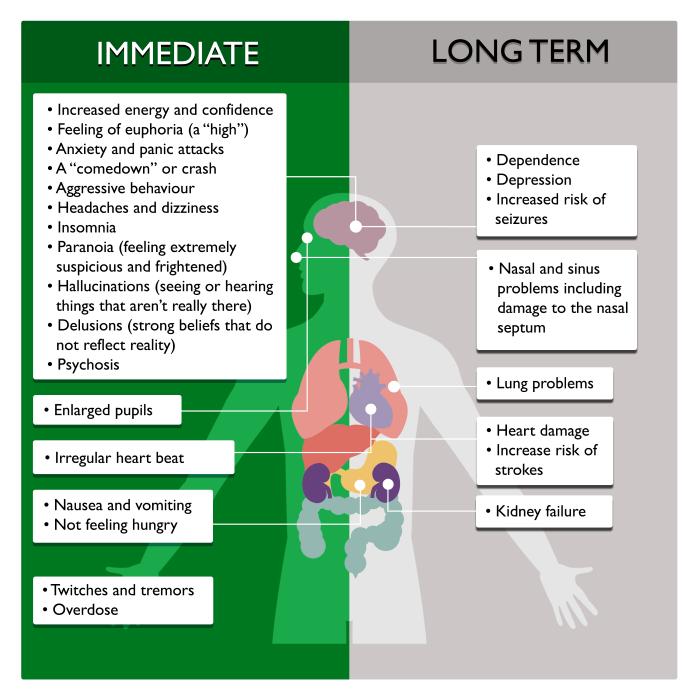What is Cocaine?
In Australia, Cocaine is known as coke, blow, charlie, C, dust, flake, nose candy, snow, white, crack, rock, freebase.
Cocaine is produced from the leaves of Erthroxylon coca plant, and comes in three main forms:
- A paste which is often off-white or light brown
- A powder which is often white or off-white
- A white or off-white crystal rock known as crack cocaine.
In Australia, cocaine is most commonly in a powder form which is often snorted. As with all powder drugs, it is often sold ‘cut’ (mixed) with other white powder substances which can sometimes be harmful in their own right.
Personal Stories“It started off only occasionally. But soon I was taking cocaine in the morning just to get through the day. My friends stopped talking to me. My girlfriend left me and I had to steal from my own family just to pay for drugs.”
–Francis, 17
How many young people have tried Cocaine?According to the 2022-2023 Australian secondary schools' survey, 1 in 100 students (1%) aged 12–17 used cocaine in the past month.
What are the effects of Cocaine?When snorted or injected, cocaine quickly produces an intense ‘rush’. This feeling or ‘high’ doesn’t last very long — usually around 30–45 minutes if snorted.
The effects of cocaine can be immediate or long-term, as listed in the table below.
| Immediate |
Long-term |
| Enlarged pupils |
Dependence (see glossary) |
| Irregular heart beat |
Nasal and sinus problems including damage to the nasal septum |
| Not feeling hungry |
Depression |
| Increased energy and confidence |
Heart damage |
| Feeling of euphoria (a "high") |
Lung problems |
| Nausea and vomiting |
Kidney failure |
| Anxiety and panic attacks |
Increased risk of strokes and seizures |
| A "comedown" or crash (see glossary) |
|
| Aggressive behaviour |
|
| Headaches and dizziness |
|
| Twitches and tremors |
|
| Insomnia |
|
| Paranoia (feeling extremely suspicious and frightened) |
|
| Hallucinations (seeing or hearing things that aren't really there) |
|
| Delusions (strong beliefs that do not reflect reality) |
|
| Psychosis (see glossary) |
|
| Overdose |
|

Evidence BaseThis factsheet was developed following expert review by researchers at the Matilda Centre for Research in Mental Health and Substance Use at the University of Sydney, the National Drug & Alcohol Research Centre at the University of New South Wales, and the National Drug Research Institute at Curtin University.
- Scully, M., Koh, I., Bain, E., Wakefield, M., & Durkin, S. (2023). ASSAD 2022–2023: Australian secondary school students’ use of alcohol and other substances. Cancer Council Victoria.
- WHO, 2004. Neuroscience of psychoactive substance use and dependence. 2. Bucello, C., Degenhardt, L., Calabria, B., Nelson, P., Roberts, A., Medina-Mora, M. and Compton, W., 2010. What do we know about the extent of cocaine use and dependence? Results of a global systematic review. NDARC Technical Report No . 308, National Drug and Alcohol Research Centre, University of New South Wales: Sydney.
- Kuhar, M., Ritz, M. and Boja, J., 1991. The dopamine hypothesis of the reinforcing properties of cocaine. Trends in Neuroscience. 14: p. 299 - 302.
- WHO/UNICJRI, 1995. Cocaine Project.
- Julien, R., Advokat, C. and Comaty, J., 2011. A primer of drug action, 12th Edition, New York: Worth Publishers.
- Australian Crime Commission, 2012. Illicit Drug Data Report 2010-11, Australian Crime Commission: Canberra.
- Sindicich, N. and Burns, L., 2012. Australian Trends in Ecstasy and related Drug Markets 2011. Findings from the Ecstasy and Related Drugs Reporting System (EDRS). Australian Drug Trend Series No. 82. , National Drug and Alcohol Research Centre, University of New South Wales: Sydney.
- Stafford, J. and Burns, L., 2012. Australian Drug Trends 2011. Findings from the Illicit Drug Reporting System (IDRS). Australian Drug Trend Series No. 73 National Drug and Alcohol Research Centre, University of New South Wales: Sydney.
- Australian Institute of Health and Welfare, 2023. National Drug Strategy Household Survey 2022-2023 report, AIHW: Canberra.
- Kaye, S. and Darke, S., 2003. Non-Fatal Cocaine Overdose and Other Adverse Events Among Injecting and Non-Injecting Cocaine Users. NDARC Technical Report No. 170, National Drug and Alcohol Research Centre, University of New South Wales: Sydney.
- National Drug and Alcohol Research Centre, 2012. On Ice booklet, University of New South Wales: Sydney.
- Darke, S., Torok, M., Kaye, S. and Duflou, J., 2010. Cardiovascular disease risk factors and symptoms among regular psychostimulant users. Drug and Alcohol Review. 29(4): p. 371-7.
- Darke, S., Kaye, S., McKetin, R. and Duflou, J., 2008. Major physical and psychological harms of methamphetamine use. Drug and Alcohol Review. 27(3): p. 253-62.
- Herbst, E.D., Harris, D.S., Everhart, E.T., Mendelson, J., Jacob, P. and Jones, R.T., 2011. Cocaethylene formation following ethanol and cocaine administration by different routes. Experimental and Clinical Psychopharmacology. 19(2): p. 95-104.
- Farooq, M.U., Bhatt, A. and Patel, M.B., 2009. Neurotoxic and Cardiotoxic Effects of Cocaine and Ethanol. Journal of Medical Toxicology. 5(3): p. 134-138.
- van Beek, R.D.A.M.I., 2001. Cocaine injecting: the sharp end of drug-related harm! Drug and Alcohol Review. 20(3): p. 333-342.
- Mahoney, J.J., 3rd, Kalechstein, A.D., De La Garza, R., 2nd and Newton, T.F., 2008. Presence and persistence of psychotic symptoms in cocaine- versus methamphetamine-dependent participants. American Journal on Addictions. 17(2): p. 83-98.
- Kaye, S. and Darke, S., 2004. Injecting and non-injecting cocaine use in Sydney, Australia: physical and psychological morbidity. Drug and Alcohol Review. 23(4): p. 391-398.
- American Psychiatric Association, 2000. Diagnostic and statistical manual of mental health disorders, fourth edition, text revision, Washington, DC: American Psychiatric Association.